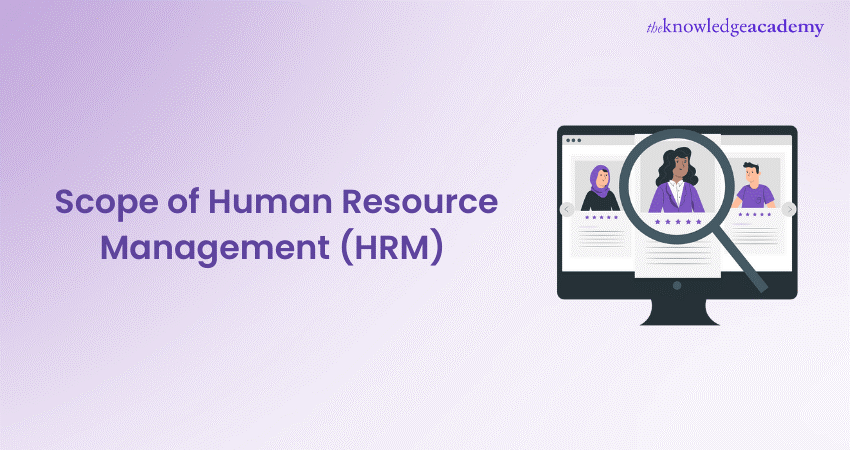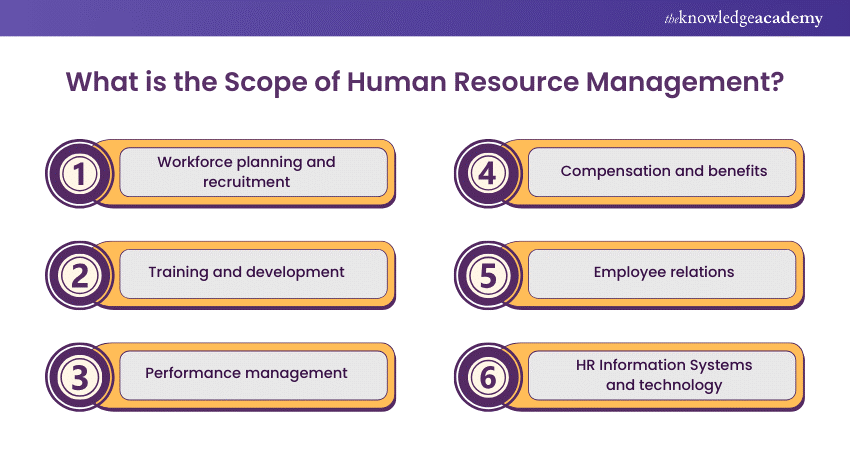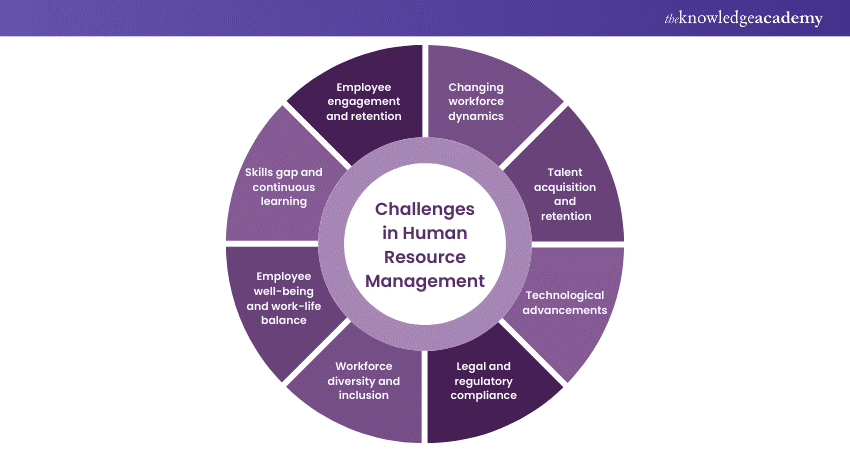We may not have the course you’re looking for. If you enquire or give us a call on +44 1344 203 999 and speak to our training experts, we may still be able to help with your training requirements.
Training Outcomes Within Your Budget!
We ensure quality, budget-alignment, and timely delivery by our expert instructors.

Human Resource Management (HRM) is vital for organisations to effectively manage the most valuable asset: people or employees. It encompasses numerous activities to attract, develop, and retain talented individuals. But what are these activities, and how can they add to organisational success? To answer this question, it’s important to understand the Scope of Human Resource Management.
The Scope of Human Resource Management (HRM) is vast that goes beyond developing training, mentoring, and learning programs for employees. Want to know how? In this blog, you'll delve into the Scope of Human Resource Management and learn about the key functions of HR professionals, as well as the challenges they face.
Table of Contents
1) What is Human Resource Management?
2) What is the Scope of Human Resource Management?
3) Responsibilities of HR professionals
4) Challenges in Human Resource Management
5) Conclusion
What is Human Resource Management?
Human Resource Management refers to the formal systems established within organisations to oversee various aspects related to managing their workforce. This critical function encompasses several key responsibilities, including staffing, employee development and training. Additionally, it also includes performance management, compensation and benefits administration, organisational development, and maintaining employee relations.
The significance of HRM cannot be overstated, as it plays a monumental role in shaping an organisation's success. Regardless of the quality of the services or products offered, a productive workforce is indispensable for achieving business goals. HRM is tasked with ensuring that an organisation possesses the right mix of talent and skillsets required to thrive in its respective industry.
Furthermore, HRM assumes the crucial responsibility of providing the necessary support and resources to empower employees to perform effectively in their roles. It's important to recognise that HRM sets the tone for how an organisation treats its workforce.
Companies that excel in HRM practices tend to enjoy lower turnover rates, higher levels of employee satisfaction and increased overall productivity. Overall, HRM is a cornerstone in building a thriving and successful organisation.
What is the Scope of Human Resource Management?
From workforce planning and recruitment to managing employee relations, Human Resource Management encompasses a diverse range of responsibilities that shape an organisation's success. Let's explore the Scope of Human Resource Management below:

Workforce planning and recruitment
Workforce planning and recruitment within Human Resource Management involve strategically assessing an organisation's current and future staffing needs. It encompasses identifying talent gaps, developing recruitment strategies, and selecting the right candidates to join the workforce.
Effective recruitment ensures that the organisation is equipped with the skills and competencies necessary to achieve its objectives.
Training and development
Training and development initiatives aim to enhance employees' skills, knowledge, and capabilities. Strategic Human Resource Management oversees the creation and implementation of training programs, workshops, and development plans. This helps employees continually improve and adapt to evolving job requirements, fostering both individual and organisational growth.
Performance management
Performance management involves setting clear expectations, evaluating employee performance, and providing feedback. HRM establishes performance appraisal systems, assesses employee contributions, and supports professional growth. Effective performance management aligns individual achievements with organisational goals.
Compensation and benefits
Compensation and benefits administration ensures that employees are fairly rewarded for their contributions. HRM designs compensation structures, administers payroll, and manages employee benefits packages. This plays a crucial role in drawing and retaining top talent while maintaining equity within the organisation.
Employee relations
One of the main Objectives of Human Resource Management is employee relations. Employee relations focus on maintaining a positive and productive work environment. HRM handles conflict resolution, fosters strong communication channels, and promotes a harmonious workplace culture. Building healthy relationships among employees and between employees and management is central to this aspect.
HR Information Systems and technology
HR Information Systems (HRIS) and technology are integral for managing HR functions efficiently. HRM utilises software and technology tools for tasks such as payroll processing, data management, and reporting. These systems streamline HR operations, enhance data accuracy, and enable data-driven decision-making within the organisation.
The Scope of Human Resource Management encompasses these critical areas. They all work together to create a conducive environment for talent acquisition, development, and overall organisational success.
Responsibilities of HR professionals
A professional in HR department serves as the cornerstone for building a strong organisational structure and meeting the evolving needs of a business by effectively overseeing its most valuable asset: its workforce. Here are the key responsibilities of an HR professional included within the Scope of Human Resource Management:
Ensuring legal compliance and ethical standards
Human Resources professionals hold an important position in upholding compliance with labour laws, employment regulations, and ethical norms within an organisation. They craft policies that balance these regulations and support honest and ethical treatment of employees. This vital role not only safeguards the organisation from potential legal and ethical quandaries but also safeguards the rights and well-being of its workforce.
Fostering a positive and inclusive workplace culture
HR professionals hold the responsibility of cultivating a workplace culture that thrives on diversity, inclusivity, and equitable opportunities. They take proactive steps to battle against discrimination, encourage mutual respect, and instil a spirit of cooperation and unity within the organisation. In addition, HR professionals actively engage in addressing employee concerns and managing conflicts. As a result, they promote an environment where every individual can excel and contribute positively.
Crisis management and change management
In times of crisis or organisational downfall, HR professionals take a pivotal role in adeptly navigating the transition process. They extend vital support to employees, relay essential information about changes, and work to mitigate any adverse effects on the workforce. HR professionals essentially serve as catalysts for change, facilitating seamless transition and helping employees embrace and adjust to new circumstances with agility.
Transform your skills with our HR Skills For Non-HR Managers Course – Sign up now!
Challenges in Human Resource Management
While understanding the Scope of Human Resource Management, HR professionals may face various challenges, particularly in today's dynamic business environment. These challenges require Human Resource professionals to adapt and find innovative solutions to manage the workforce effectively. Let's explore some of the challenges faced by HRM:

Changing workforce dynamics
HRM must navigate through the complexities of a changing workforce. This includes managing a multigenerational workforce with diverse values, expectations, and work styles. HR professionals need to implement strategies that promote collaboration, knowledge sharing, and effective communication across different generations.
Talent acquisition and retention
Finding and retaining top talent is a continuous challenge for Human Resource Management professionals. The demand for highly skilled professionals often exceeds the supply, making recruitment competitive. HR professionals need to develop effective employer branding strategies and implement robust recruitment processes. They must also create attractive employee value propositions to attract and retain the best candidates.
Technological advancements
Rapid advancements in technology bring both opportunities and challenges for the Scope of Human Resource Management. HR professionals need to adapt to digital transformation and implement and leverage Human Resource technology solutions. They should also navigate the complexities of managing virtual teams and remote work. Integrating Artificial Intelligence (AI) and automation requires HRM to redefine job roles, reskill employees, and ensure a smooth transition.
Legal and regulatory compliance
Human Resource Management operates in a complex legal and regulatory landscape. Human Resource professionals need to stay updated with employment laws, regulations, and compliance requirements. This includes areas such as labour laws, health and safety regulations, data privacy laws, and anti-discrimination legislation. Ensuring compliance is crucial to protect the organisation and employees from legal risks.
Workforce diversity and inclusion
Managing workforce diversity and fostering inclusion is a critical challenge for Human Resource professionals . They must create an inclusive work environment that values diversity in terms of gender, ethnicity, age, and other dimensions. This involves implementing diversity and inclusion initiatives, addressing biases, promoting equal opportunities, and managing potential conflicts.
Employee well-being and work-life balance
Human Resource professionals need to prioritise employee well-being and work-life balance. They must design and implement initiatives that support employee mental health, promote work-life balance, and address workplace stress. This includes wellness programs, flexible work arrangements, and fostering a culture that values work-life integration.
Unlock your HR potential with our comprehensive Introduction To HR Course - sign up now!
Skills gap and continuous learning
Human Resource Management deals with bridging the skills gap between the existing workforce and the evolving needs of the organisation. Human Resource professionals need to identify skill gaps and develop training programs. They also require to promote a culture of continuous learning and development. This involves reskilling and upskilling employees to keep pace with technological advancements and industry trends.
Employee engagement and retention
Engaging and retaining employees is crucial for HRM. Human Resource professionals must implement strategies promoting employee engagement, such as recognition programs, career development opportunities, and positive work culture. They must also address factors contributing to employee turnover, like lack of growth opportunities, inadequate compensation, or poor work-life balance.
Conclusion
All in all, the Scope of Human Resource Management incorporates everything from attracting and retaining talent to fostering a positive work culture. Despite facing various challenges, HRM plays a crucial role in an organisation's success by managing its most valuable asset: its people.
Elevate your HR career to new heights with our Certified HR Manager Course – register today!
Frequently Asked Questions

While all aspects of HRM are essential, workforce planning and recruitment hold particular significance. Ensuring the right talent is in place is fundamental to an organisation's success. Effective workforce planning not only meets current needs but also prepares the organisation for future challenges and opportunities.

Pursuing a career in HRM offers individuals the opportunity to contribute to organisational growth, foster a positive work environment, and positively impact employee lives. It allows for a dynamic role that combines people skills with strategic decision-making, offering a fulfilling career path.

The Knowledge Academy takes global learning to new heights, offering over 30,000 online courses across 490+ locations in 220 countries. This expansive reach ensures accessibility and convenience for learners worldwide.
Alongside our diverse Online Course Catalogue, encompassing 17 major categories, we go the extra mile by providing a plethora of free educational Online Resources like News updates, Blogs, videos, webinars, and interview questions. Tailoring learning experiences further, professionals can maximise value with customisable Course Bundles of TKA.

The Knowledge Academy’s Knowledge Pass, a prepaid voucher, adds another layer of flexibility, allowing course bookings over a 12-month period. Join us on a journey where education knows no bounds.

The Knowledge Academy offers various HR Courses, including Certified HR Advisor, Certified HR Manager and Introduction to HR Courses. These courses cater to different skill levels, providing comprehensive insights into Human Resource Development.
Our Business Skills blogs cover a range of topics related to HR, offering valuable resources, best practices, and industry insights. Whether you are a beginner or looking to advance your Human Resources Skills, The Knowledge Academy's diverse courses and informative blogs have you covered.







 Top Rated Course
Top Rated Course




 If you wish to make any changes to your course, please
If you wish to make any changes to your course, please


